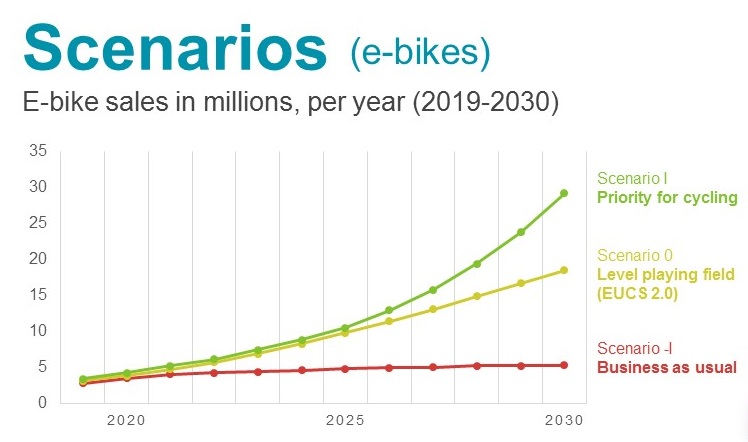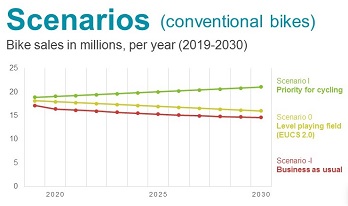
What would Happen if We Prioritised Cycling?
The European Cyclists' Federation (ECF) analysed the data from the latest (e-)bike market reports released by CONEBI and the general trends in the mobility sector in urban and suburban areas. The result of this analysis was presented at Eurobike by Adam Bodor, Director of Advocacy and EuroVelo of ECF.
“Bicycle sales could reach 50 million units annually by 2030”
In 2017, ECF estimated the growth of e-bike sales by at least 16% based on figures from 2013-15, meaning sales would reach 12 million units per year by 2030. However, as consumers seek greener and more efficient modes of transport, e-bike sales have increased by 22% between 2015 to 2017. Under more favourable conditions than those currently in place, ECF estimates that e-bike sales alone could reach 30 million units annually. Conventional bikes sales would also grow moderately and reach an estimated 20 million in annual sales.

Several factors can influence bicycle sales, including for example the marketing of attractive products (bicycles, accessories), services (leasing, repair, retail, customer care) and the promotion of a cycling friendly environment. This means that both the production of bikes and the environment in which they thrive should focus on meeting the needs of consumers that demand safety, access and inclusiveness, regardless of age, experience or gender. At the moment, only 1% of the EU population are “fearless and strong” cyclists and 6% are confident cycling enthusiasts. A further 60% are interested but concerned (mostly about road safety). This creates an untapped potential for 343,4 million cyclists on the road and purchasing bikes, which would not only reduce carbon emissions and improve public health but would also contribute to job creation and economic development in the cycling industry sector.
ECF predicts three different scenarios for the future of bicycle sales in Europe (see figure 1 and 2). If we continue with business as usual, e-bike sales will only grow very moderately over time. In the case of level playing field, e-bike sales would rise. However, both options would risk bringing conventional bicycle sales to a hold, or even result in a reduction of conventional bicycle sales to the benefit of e-bikes. The third and best option would see both e-bike and conventional bike sales grow.


What is a Cycling-Friendly Environment?
Different factors contribute to the development of a cycling-friendly environment, which should ultimately encourage all types of cyclists. Simply speaking, a cycling-friendly environment is built around active mobility rather than motorised transport.
ECF has identified essential features for the creation of a cycling-friendly environment, which are for example:
- building safe, attractive, comfortable and direct cycle routes
- reallocating public spaces for cycling and walking
- 20% of transport investments should be dedicated to cycling
- EU cycling investments should increase to 3 Billion (2021-27) and to 6 Billion by 2028-2034
- Zero VAT should be put on e-bikes. In contrast, a standard tax should be levied on e-cars
- Extra tax should be put on conventional cars, and company car schemes should be eliminated
- No mandatory insurance for e-bikes
- No helmet laws
- Car free cities and high parking fees
Most importantly, in order to be effective, these measures need to be implemented by governance systems at the local, national, European, and global level.
ECF and its members will continue to work on creating this cycling friendly environment. For example, ECF’s main member in Germany, the ADFC e.V. (German National Cyclists' Association), presented their 2019 campaign #MehrPlatzfuersRad (more space for bikes) at Eurobike 2019.
 The ADFC booth also showcased a model protected bike lane for better cycling. The ADFC National Director, Burkhard Stork, and members of the federal board, Dr. Gereon Broil and Ralf Puslat, welcomed Members of the German Bundestag at their booth during the event.
The ADFC booth also showcased a model protected bike lane for better cycling. The ADFC National Director, Burkhard Stork, and members of the federal board, Dr. Gereon Broil and Ralf Puslat, welcomed Members of the German Bundestag at their booth during the event.
Approaching 343,4 Million Potential Cyclists – more Attractive Bikes and Services
It should not be forgotten that bicycles are essentially products that need to be sold. This is where the cycling industry comes in. The European market offers around 343,4 million potential buyers. At the moment, most companies are competing in the first, very narrow segment of the market.
One rarely sees an elderly person enjoying their bike ride, a mother transporting three children, or commuters on their way to work in advertisements for bicycles. The image that is portrayed is one where the cyclists are usually male, aged between 30 to 50, and in peak physical condition. Moreover, the bicycles featured in marketing images are often designed for racing rather than for recreation or commuting.
Furthermore, marketing for bicycles often gets lost in technical details. Innovation, new products, and design are key for attracting new buyers and grabbing the attention of customers. However, these advances are generally marketed to the tech savvy bicycle enthusiast and do not address the wider potential market of bicycle users. For example, a chainless bicycle is not just a great innovation, but it could also be a practical solution for commuters, families and tourists, which may justify an investment on a pricier bicycle.
Only few companies present at conferences such as Eurobike properly invest in their branding and image (for example Bianchi). On the one hand, this is a reflection of the nature of the cycling industry, which is driven by small and medium enterprises and geared towards a niche type of customer. On the other hand, it`s also a burden for reaching out for wider audiences.
To unlock the full potential of bicycle sales, the cycling industry should improve on both fronts of speeding up innovation and creating attractive and affordable bicycles, which target the majority of European citizens. We also need to learn from other business sectors and diversify our workforce by employing and empowering women, youth and the elderly, as well as people from different backgrounds and ethnicities.
Acknowledgements:
This research was presented by Adam Bodor at the Cycling Industries Leader’s Breakfast on September 5th, within the backdrop of the Eurobike fair in Friedrichshafen, Germany. In partnership with Eurobike, ECF co-organised the networking event alongside Cycling Industries Europe (CIE), CONEBI and the World Federation Sporting Goods Industries.
Eurobike is the leading trade show for bike business, which gathers experts and stakeholders from the mobility sector to engage in debates, share knowledge and exchange ideas.
ECF gratefully acknowledges support from our contributors, such as Cycling Industries Europe (CIE), which allow ECF to operate as a non-profit and politically independent organisation.
Regions:
Network/Project Involved:
Contact the author
Recent news!
Upcoming events
Contact Us
Avenue des Arts, 7-8
Postal address: Rue de la Charité, 22
1210 Brussels, Belgium









